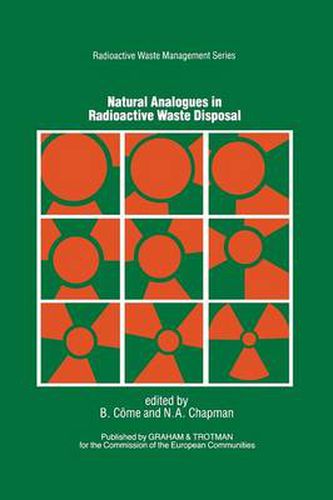Readings Newsletter
Become a Readings Member to make your shopping experience even easier.
Sign in or sign up for free!
You’re not far away from qualifying for FREE standard shipping within Australia
You’ve qualified for FREE standard shipping within Australia
The cart is loading…






This title is printed to order. This book may have been self-published. If so, we cannot guarantee the quality of the content. In the main most books will have gone through the editing process however some may not. We therefore suggest that you be aware of this before ordering this book. If in doubt check either the author or publisher’s details as we are unable to accept any returns unless they are faulty. Please contact us if you have any questions.
In order to validate predictive models of the very long-term processes which affect the performance of radioactive waste repositories, there has been an increased interest in the information and understanding which can be obtained from studying similar mechanisms in natural systems. These natural analogues , as they are known in the jargon of waste management, have been studied sporadically for many years, but there has been a considerable rejuvenation of interest in the last four years, possibly owing to the fact that performance assessment methodolo gy is gradually maturing to the point where it needs the kind of support which analogues can offer. Since 1982, the Commission of the European Communities has been involved in specific work on natural analogues in the framework of its activities on radioactive waste management, principally within the MIRAGE project which concerns migration of radionuclides in the geosphere. As a consequence, the Commission took the initiative, in 1985, of establish ing a Natural Analogue Working Group (NAWG) whose members can benefit from the overall expertise available for managing their own natural analogue research programmes. In this group, modeller’ s requirements and the results of field research are exchanged at regular intervals. A number of wide-ranging investigation programmes, both on national and international scales. are currently underway or being initiated, and several of these have been discussed recently at the NAWG.
$9.00 standard shipping within Australia
FREE standard shipping within Australia for orders over $100.00
Express & International shipping calculated at checkout
This title is printed to order. This book may have been self-published. If so, we cannot guarantee the quality of the content. In the main most books will have gone through the editing process however some may not. We therefore suggest that you be aware of this before ordering this book. If in doubt check either the author or publisher’s details as we are unable to accept any returns unless they are faulty. Please contact us if you have any questions.
In order to validate predictive models of the very long-term processes which affect the performance of radioactive waste repositories, there has been an increased interest in the information and understanding which can be obtained from studying similar mechanisms in natural systems. These natural analogues , as they are known in the jargon of waste management, have been studied sporadically for many years, but there has been a considerable rejuvenation of interest in the last four years, possibly owing to the fact that performance assessment methodolo gy is gradually maturing to the point where it needs the kind of support which analogues can offer. Since 1982, the Commission of the European Communities has been involved in specific work on natural analogues in the framework of its activities on radioactive waste management, principally within the MIRAGE project which concerns migration of radionuclides in the geosphere. As a consequence, the Commission took the initiative, in 1985, of establish ing a Natural Analogue Working Group (NAWG) whose members can benefit from the overall expertise available for managing their own natural analogue research programmes. In this group, modeller’ s requirements and the results of field research are exchanged at regular intervals. A number of wide-ranging investigation programmes, both on national and international scales. are currently underway or being initiated, and several of these have been discussed recently at the NAWG.